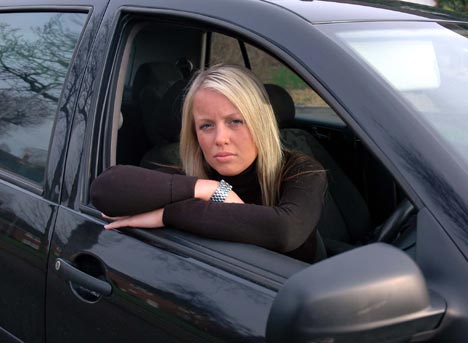Law Weblog
Common sense has prevailed – the judge the apple core and the council
Thursday 17 April 2008 at 4:23 pm | In News | Post CommentAccording to Judge Nicholas Webb at Wolverhampton Crown Court, common sense has prevailed when lawyers for Wolverhampton City Council, offered no evidence against Kate Badger, 26, who was accused of dropping an apple core.
The case has already cost taxpayers thousands of pounds and a trial before a jury would have cost up to £5,000 a day.
Miss Badger was not the person who threw “controlled waste†from her Volkswagen Golf parked in a Wolverhampton street on 19 March 2007. But, council chiefs wanted Miss Badger to pay a £60 penalty notice for the offence but she refused and elected go to court. Only at court did she identify who was responsible. The authority is now pursuing the culprit.
Prosecuting lawyers could sit in judgement
Wednesday 9 April 2008 at 10:00 pm | In News | 1 CommentThe Times reports on calls to end the ban on Crown Prosecution Service lawyers becoming judges. Supporters say the move would increase diversity amongst the judiciary.
R (on the application of Gentle and another) v The Prime Minister [2008] HL
Wednesday 9 April 2008 at 9:36 pm | In News | Post CommentThe House of Lords unanimously rejected an attempt to use the European Convention on Human Rights to force the government into holding a public inquiry into the circumstances surrounding the invasion if Iraq. The action was brought by the mothers of two young soldiers who died in Iraq.
A rarely convened court of nine law lords found that Article 2 of the ECHR, which protects the right to life, could not be applied to question the legality of a nation’s decision to resort to war.
Lord Bingham said that the lawfulness of military action had no immediate bearing on the risk of fatalities. He cited the example of Pearl Harbour, where a flagrantly unlawful surprise attack on the American fleet minimised the risk to the aggressor.
He further said that the High Court and the Court of Appeal had dismissed the claim, despite the sympathy they felt for the appellants, and that he had reached the same conclusion.
Lord Hope said that had there been an issue which was capable of being reviewed by the courts, they would have done so.
Baroness Hale said that if the use of force was lawful, it would be of some comfort to the mothers to know that their sons had died in a just cause.
Baroness Hale went on to say that she wished that Article 2 did impose a duty on a state not to send its soldiers to fight in an unlawful war.
The Corporate Manslaughter and Corporate Homicide Act comes into force today – 6 April 2008
Saturday 5 April 2008 at 11:21 pm | In News | Post CommentThe Act will make it easier to prosecute firms for deaths in the workplace.The Act sets out a new offence where a “gross failure” results in a person’s death.
Courts are able to look at management systems and practices across the organisation rather than simply the actions of individuals. Firms will increasingly be called upon to demonstrate that they have good safety procedures in place, particularly those companies involved with a supply chain business using contractors or suppliers.
One aspect of the act that is less helpful is the ability of courts to impose an order requiring the organisation to publicise details of its conviction and fine.
The Corporate Manslaughter Act is not just about complying with the law, it’s about making sure that businesses have the right ‘attitude’. If a company has a good, strong management system then the new act will not give rise to fundamental changes in a company’s procedures. It is more a case for those businesses that are not as robust who need to be aware of the act.
The main benefit of the Act may be to raise the profile of good health and safety.
Employers that are already meeting their existing obligations under the Health and Safety at Work Act 1974 have nothing to fear, as this new act does not bring with it any further requirements.
If an employer is found guilty of corporate manslaughter there is increased damage to the organisational reputation. We have seen some cases such as major rail disasters resulting in punitive fines from the Health and Safety Executive and subsequent damaging headlines. That kind of negative publicity will increase significantly by this legislation.
There were 0.8 fatal workplace injuries for every 100,000 workers in 2006-07.
Highest Barristers Fees Year Ending 31st March 2008
Tuesday 11 March 2008 at 7:53 am | In News | Post CommentThe Ministry of Justice has released figures showing the ten highest paid criminal barristers from the criminal defence service, year ending 31 March 2007:
BALBIR SINGH £ 957,000 (pictured)
JOHN C REES Q.C. £956,000
OLIVER BLUNT Q.C. £924,000
GEORGE A CARTER-STEPHENSON Q.C. £763,000
ABBAS LAKHA Q.C. £760,000
TREVOR BURKE Q.C. £711,000
JAMES LEWIS Q.C. £692,000
PETER LODDER Q.C. £678,000
THOMAS W DERBYSHIRE Q.C. £668,000
RICHARD FERGUSON Q.C. £663,000
Cameras in court abandoned, except Supreme Court
Monday 10 March 2008 at 7:30 am | In News | Post Comment The Guardian reports…
The Guardian reports…
The former lord chancellor, Lord Falconer, was poised to allow not only hearings in the court of appeal but judges’ summings-up to juries and sentencing remarks in crown court criminal trials to be broadcast. Legislation would have been necessary because a statutory ban imposed in 1925 prevents filming in English and Welsh courts.
But the initiative has been killed off by his successor, Jack Straw, and is now “dead,” according to the source. The exception will be the new supreme court, which opens in October 2009 and will not be covered by the ban. Cases heard there could be broadcast – but only if the judge who becomes its first president agrees.
Full article here
The minimum wage
Thursday 6 March 2008 at 6:23 am | In News | Post Comment The minimum wage, from 1 October 2008 will be:
The minimum wage, from 1 October 2008 will be:
- 16-17 year old rate will rise from £3.40 to £3.53
- 18-21 year olds will also increase from £4.60 to £4.77
- adult rate will rise from £5.52 to £5.73
Tony Blair’s brother a judge, just like his wife
Friday 29 February 2008 at 1:47 pm | In News | Post CommentTony Blair was among the lawyers, judges and family members who attended the courtroom ceremony at the Royal Courts of Justice in London. The swearing-in was performed by the Lord Chief Justice, Lord Phillips of Worth Matravers. Mr Blair, 57, will begin his duties in the High Court’s Queen’s Bench Division today.
Law most popular subject at university
Friday 22 February 2008 at 3:21 pm | In News | Post Comment Last week the latest figures from UCAS were made available and they show a continued rise in the number of university applicants.
Last week the latest figures from UCAS were made available and they show a continued rise in the number of university applicants.
As of 15 January, the date by which applicants should apply to be given equal consideration, there were 430,489 people applying for a full-time undergraduate course at UK universities and colleges – a rise of 8.9% or 35,182.
The top five subject choices remain the same at this point in the year as last year with some small changes in order.  Law by area remains top, pre-clinical medicine climbs from third to second, psychology falls to third and English studies and management studies swap places and are now fourth and fifth respectively.
For 2008 entry, the maximum number of course choices that an applicant can make has changed from six to five.
Anthony McClaran, UCAS Chief Executive said: “These figures show that for the second year running we are seeing strong growth in the level of applications for undergraduate courses. These figures provide an encouraging indication for the likely position in the summer and, of course, there will still be thousands more applications between now and then.”
The judge the jury and the apple core
Saturday 9 February 2008 at 3:56 pm | In News | 1 Comment Kate Badger is accused of tossing an apple core out of the window of her parked car in the centre of Wolverhampton.
Kate Badger is accused of tossing an apple core out of the window of her parked car in the centre of Wolverhampton.
Her VW Golf was traced by the numberplate and she received a £60 fixed penalty. She refuses to pay because she was in a shop at the time of the alleged offence.
When the case arrived at the Magistrates’ Court Ms Badger elected trial in the Crown Court. Rather than back down the authorities intend to pursue the matter before a judge and jury; over an apple core.
The Litter (Fixed Penalty)(England) Order 2002 provides for the issuing of a fixed penalty for litter offences. Litter offences are controlled by the Environmental Protection Act 1990.
Section 33 of the Act makes criminal most dumping, dropping and disposing of waste.
When an offender refuses the option of a fixed penalty the authorities have the option to take an offender to court. As with all criminal matters the court is the Magistrates’ Court to start with and for serious crimes the option is the Crown Court.
The Crown Court sees cases of mass dumping of dangerous materials such as asbestos which usually result in prison. The Crown Court can impose five years a fine or both, magistrates are limited to a fine of £20,000 or six months.
The person who is alleged to have dropped the apple core has the choice of trial by judge and jury. In this case, there is no likelihood whatsoever of prison or large fine, but the trial will take place in exactly the same manner as a robbery or murder. Judge, jury, barristers and court officials.
According to the Daily Mail the case has already been running for 11 months and has consumed thousands of pounds in legal fees.
Our guess is that the judge will look for his Latin translation of de minimis non curat lex (the law takes no account of trifles).
Finally, AS students will be demanding to know why the text books and their teacher have told them that the magistrates can only impose fines of up to £5,000. The answer is that pollution offences have always been an exception to that rule but teachers and text book writers try to avoid complicating matters.
Powered by WordPress with Pool theme design by Borja Fernandez.
Entries and comments feeds.
Valid XHTML and CSS. ^Top^
